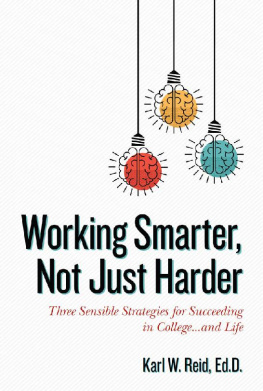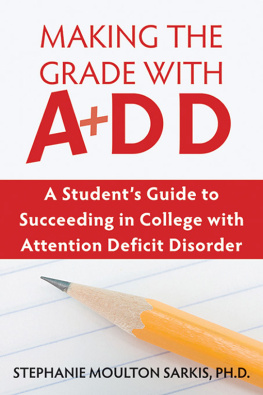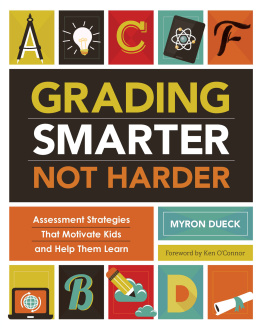WORKING SMARTER,
NOT JUST HARDER
WORKING SMARTER,
NOT JUST HARDER

THREE SENSIBLE STRATEGIES FOR SUCCEEDING IN COLLEGE...AND LIFE
Karl W. Reid, Ed.D.
Copyright 2017 Karl W. Reid, Ed.D.
All rights reserved.
ISBN: 0692834907
ISBN 13: 9780692834909
Library of Congress Control Number: 2017900694
Karl W. Reid,Silver Spring,MARYLAND

DEDICATION
To my father who taught me how to dream, and my sister who showed me what dreams can achieve.
Kenneth W. Reid
1927-1994
Monique Reid Berryhill
1956-2005

ACKNOWLEDGEMENTS
The Biblical writer to the Hebrews wrote, Therefore, since we are surrounded by such a great cloud of witnesseslet us run with perseverance the race marked out for us (Hebrews 12:1).
Im so grateful for my cloud of witnesses whove supported and inspired me throughout this journey. My wife, Andrea, is an endless source of inspiration especially over the past five years while I was writing and rewriting this book. Our children, Jasmine, Drew, and Miles, have exemplified unconditional love despite my frequent physical and emotional absences during this period. My parents, Joyce and the late Kenneth Reid, instilled in me big dreams and the zeal to share the benefits of high-quality education with the most marginalized among us. My siblings, Keith, Kendrick, and my late sister Monique, have always been models of excellence whove cheered me on from afar. I am also grateful for my mother-in-love, Gloria Robinson, who ignited my passion to pursue education advocacy when she prophetically sent me Jonathan Kozols Savage Inequalities back in 1991. My dear pastors, Gideon Thompson, Ray Hammond, and Matthew Watley, provided inspired spiritual care while showing me The Way to discover and pursue my purpose. Thanks to Rick Horowitz of Prime Prose, LLC and Eric Addison of Addison Editorial Services, LLC, for their expertise in helping to bring this manuscript to life and make it more accessible to its intended audiences. Im very grateful to my NSBE family, which has given me a platform to express my true calling. And most importantly, I thank God in whom I live, and move, and have my being (Acts 17:28).
TABLE OF CONTENTS
)

INTRODUCTION
I felt dumb. So will you.
I conquered that feeling. So can you.
Before I went to college, I was a great student. My parents and siblings marveled at how easily academic success came to me. My teachers and my parents lathered me with praise, telling me I was a smart kid. And I believed it. When I graduated from a highly ranked high school in the top 10 percent of my class, I felt I was on a glide path to success, destined to meet the high expectations that had been set for me and reap the rewards that came with it.
That is, of course, until I arrived at college.
In my first few classes there, I was confronted with the reality that I didnt understand anything going on in lecture. I was confused even when it came to subjects I had taken in high school. My first exam grade was abysmal, and it was a class in my major!
It was the first time Id ever felt so disoriented. I marveled at how so many of my classmates could have a dialogue with the professor when I could barely formulate a basic question.
Successful in high school, then struggling in college: I was hardly the only student facing this predicament. And what was true then is just as true now successful high-school grads can still hit the wall when they move to the next level.
As with every student, my background wasnt particularly unique: I grew up middle class, the third child in a mostly working-class community in Long Island, N.Y. Neither of my parents earned college degrees; my mother went right to work after high school. I idolized my older brother, who graduated from MIT as a chemical engineer. I am African American. Throughout my education, Id seen many of my classmates underperform academically after showing great talent in their early years, and Id often wondered why.
But almost everyone struggles in college. If youre like most students, youll have your first academic wake-up call in the fall semester of your freshman year. Some of you who had stronger preparation in high school may skate through that first semester, but youll hit that wall when youre introduced to new material in the spring. Regardless of when it happens, you will be challenged. If struggle hasnt come your way yet, youre either in a school or major thats not challenging you enough (and you should consider transferring), or you should get ready, because its about to happen.
Your college entrance scores are a poor predictor of whether youll earn your degree. Barely more than half of all college students earn a four-year degree within six years of entering as freshmen, and 28 percent dont return after their first year! If youre a male or a person of color African American, Native American or Latino your odds of obtaining a bachelors degree in six years are even worse.
And success is not only about how hard you study, either. Your parents and teachers have probably told you repeatedly to Study harder! Even in college, when you get a poor grade or fail to grasp the work, a professor or teaching assistant will offer that sage advice: Study harder! Its true: Students need to work harder by putting in more hours to prepare for class. According to one recent study, the average number of hours college students spend doing schoolwork outside of the classroom has dwindled over the past 50 years, from 24 hours per week to only 15.
But putting in more time doesnt always translate into better grades or deeper learning. (You may have already realized this.)
If I asked you, What does Study harder look like? you probably would conjure images of students working diligently in their dorm room say, burning the midnight oil to finish a paper. Others of you might envision all-night cramming sessions with your friends. Unfortunately, these industrious images arent always put into practice. But even when they are, many students discover that their efforts are insufficient. Theyre simply not effective.
Effective is the operative word here. Only about half of all college students recently polled said they had developed effective study habits in college. The issue, Ive come to understand, is not only about working longer or harder: Its about learning how to work smarter.
Vince Lombardi, the late Hall of Fame coach of the Green Bay Packers, famously said, The only place that success comes before work is in the dictionary. Unless youre attending a college where youre not being challenged, I know youre working hard, or at least you believe you are. However, if youre like I was, your hard work is not getting the results you expect. Its not as effective as you want it to be or as you need it to be.
It took me a while to learn the steps that helped me to be successful. Like water finding its own level, I had to discover an approach to learning that worked for me. Fortunately, during my first semester in college, I discovered that new approach. I had to. Had I not learned how to learn
Next page







